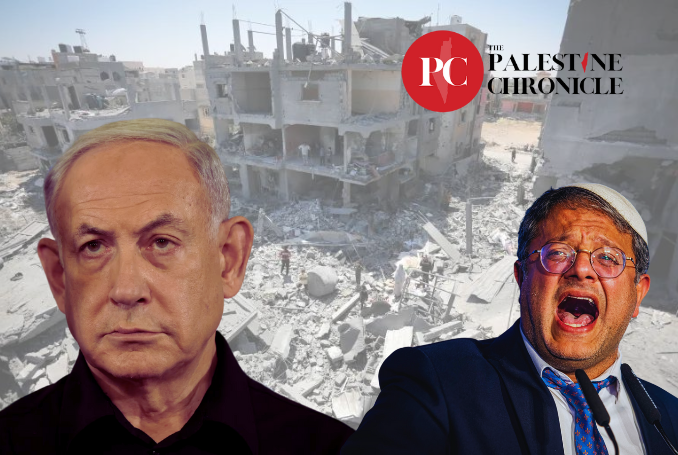
Qatar announced a ceasefire agreement on Wednesday set to end more than 15 months of deadly Israeli attacks on the Gaza Strip.
Israel’s security cabinet voted on Friday to approve a ceasefire and detainee swap deal with Hamas.
“Following an evaluation of all diplomatic, security and humanitarian aspects, and while understanding that the proposed deal supports the achievement of the objectives of the war, the Security Cabinet has recommended that the Government approve the proposed framework,” the office of Prime Minister Benjamin Netanyahu said in a statement.
Following an evaluation of all diplomatic, security and humanitarian aspects, and while understanding that the proposed deal supports the achievement of the objectives of the war, the Security Cabinet has recommended that the Government approve the proposed framework.
— Prime Minister of Israel (@IsraeliPM) January 17, 2025
The Cabinet includes 11 members, and two of them – Finance Minister Bezalel Smotrich and National Security Minister Itamar Ben-Gvir – were expected to vote against the deal. The PM’s office did not indicate who voted in support of the deal.
According to The Times of Israel, the agreement – officially signed on Thursday night – “will now move to the full cabinet for a discussion and vote expected to be held before Shabbat begins.”
Qatar announced a ceasefire agreement on Wednesday to end over 15 months of deadly Israeli attacks on the Gaza Strip. The ceasefire is set to take effect on Sunday, and will be implemented in three phases.
Families Demand Urgency
According to the Israel Hayom newspaper, when reports emerged that the government meeting would be delayed until Saturday, the Hostages and Missing Families Forum released a statement calling for the “decision makers” to not “delay their return even one more night.”
“We urge the decision-makers – set aside other matters, bring everyone home with absolute urgency,” the statement said.
Prime Minister Benjamin Netanyahu at the Security Cabinet meeting at the Prime Minister’s Office in Jerusalem. pic.twitter.com/Wx5uOxQp7D
— Prime Minister of Israel (@IsraeliPM) January 17, 2025
Meanwhile, Netanyahu stated that the release of detainees is set to proceed as planned on Sunday, reported Anadolu.
In a statement, the prime minister’s office said:
“Pending approval by the Security Cabinet and the Government, and the agreement taking effect, the release of the hostages will be implemented according to the planned framework in which the hostages are expected to be released on Sunday.”
Hamas Fully Committed
Izzat al-Rishq, a senior Hamas leader, stated on Thursday that the movement is fully committed to the terms of the ceasefire agreement.
This comes after Israeli Prime Minister Benjamin Netanyahu’s earlier statements, which suggested that Hamas had backed away from certain parts of the agreement, delaying Israel’s approval.
Hamas Rejects Netanyahu’s Allegations, Commits to Ceasefire Agreement
Netanyahu claimed that Hamas was attempting to extract additional concessions and insisted that the Israeli government would not set a date for a security cabinet meeting until the mediators confirmed that Hamas had agreed to all aspects of the deal.
The agreement is set to take effect on Sunday, pending the approval of both parties involved. Qatar, Egypt, and the United States have pledged to work closely to ensure the successful implementation of the deal.
Following the announcement, Israeli forces continued to carry out massacres throughout Gaza, killing more than 100 Palestinians, including 27 children and 31 women, and wounding over 200 more, according to Gaza’s Civil Defense.
Hamas Condemns Massacres
Hamas said in a press statement on Friday that Israel was “deliberately committing these massacres in its quest to thwart the ceasefire agreement.”
Abu Obeida warns that Israeli strikes endanger the Gaza ceasefire deal and its prisoner exchange agreement.https://t.co/SPj3HNzoFq pic.twitter.com/jA96uj8XJ1
— The Palestine Chronicle (@PalestineChron) January 16, 2025
This, the movement said, “places the mediators at their responsibilities by pressuring the war criminal Netanyahu and his extremist fascist government to stop these massacres.”
“We demand that the international community, the United Nations and all concerned parties take urgent and immediate action to stop this zionist terrorism,” the statement added.
Ongoing Genocide
The ongoing Israeli assault on the Gaza Strip, which began on October 7, 2023, has led to a humanitarian crisis of unprecedented scale. As the death toll among besieged and starved Palestinian civilians continues to rise daily, Israel is currently facing charges of genocide against Palestinians before the International Court of Justice (ICJ).
According to Gaza’s Ministry of Health, at least 46,707 Palestinians have been killed, and 110,265 wounded in Israel’s ongoing genocide in Gaza starting on October 7, 2023.
MEDICAL SOURCE TO AL-JAZEERA: Around 50 Palestinians were killed in separate Israeli airstrikes on northern Gaza since this morning. pic.twitter.com/jjjPHxhGBA
— The Palestine Chronicle (@PalestineChron) January 16, 2025
The toll is expected to rise further, with at least 11,000 people still unaccounted for, presumed dead under the rubble of their homes across Gaza.
The war, which Palestinians call “Operation Al-Aqsa Flood,” began after a military operation carried out by Hamas on Israeli territory. Israel reports that 1,139 of its soldiers and civilians were killed during the initial attack on October 7. However, Israeli media have raised concerns that a significant number of Israeli casualties were caused by ‘friendly fire’ during the assault.
Millions Displaced
Human rights organizations, both Palestinian and international, have reported that the overwhelming majority of the casualties in Gaza are women and children. The ongoing violence has also exacerbated an acute famine, with thousands of children among the dead, highlighting the severity of the humanitarian disaster.
The war has displaced nearly two million people from their homes across Gaza, with the majority of the displaced forced into the already overcrowded southern region of the Strip. The population in Gaza remains trapped in the ongoing conflict, with little access to basic necessities such as food, water, and medical care.
(PC, Anadolu)
